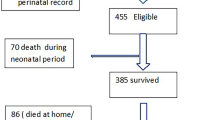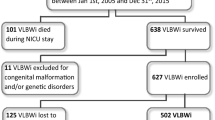Abstract
Objectives
Late preterm infants have a higher risk of early childhood developmental problems than full-term. They usually present subtle neurodevelopmental disabilities that could appear in middle and long-term time. This paper aims to determine differences in child neurodevelopment, in full-term infants and late preterm infants in Ecuadorian Mestizo newborns, using two assessment scales.
Methods
This is an epidemiological, cross-sectional, and observational research, with two patient cohorts, late preterm and full-preterm infants. The sample size was 204 individuals, 102 cases in each cohort. It gathers data from the patient’s medical records and of the patients assessed with the Brunet-Lézine scale and Abbreviated Developmental Scale-3.
Results
Among late premature infants, the incidence of developmental disorders was 16.7% and 17.6% of those born at term (p > 0.05). A statistically significant difference was obtained between the first and third developmental evaluations among late preterm infants (p < 0.05). The multivariate analysis identified male sex as a risk factor for developmental disorders. Vaginal delivery and cephalic presentation behaved as protective factors (p < 0.05).
Conclusion
In late preterm and term newborns, where child development was assessed using the Brunet-Lézine Scale and Abbreviated Developmental Scale-3, 16.7% of late preterm and 17.6% of term newborns were found to have developmental disorders, but no statistically significant difference between them. In the multivariate analysis, the most critical risk factor was male sex. Vaginal delivery and cephalic presentation behaved as protective factors.
Similar content being viewed by others

References
Aly, Z., Taj, F., & Ibrahim, S. (2010). Missed opportunities in surveillance and screening systems to detect developmental delay: a developing country perspective. Brain & Development, 32(2), 90–97. https://doi.org/10.1016/j.braindev.2009.06.004.
American Academy of Pediatrics. (2006). Identifying infants and young children with developmental disorders in the medical home: an algorithm for developmental surveillance and screening. Pediatrics, 118(1), 405–420. https://doi.org/10.1542/peds.2006-1231.
Anderson, D. E., & Patel, A. D. (2018). Infants born preterm, stress, and neurodevelopment in the neonatal intensive care unit: might music have an impact? Developmental Medicine & Child Neurology, 60(3), 256–266. https://doi.org/10.1111/dmcn.13663.
Baud, O., Trousson, C., Biran, V., Leroy, E., Mohamed, D., & Alberti, C. (2019). Two-year neurodevelopmental outcomes of extremely preterm infants treated with early hydrocortisone: treatment effect according to gestational age at birth. Archives of Disease in Childhood-Fetal and Neonatal Edition, 104(1), F30–F35. https://doi.org/10.1136/archdischild-2017-313756.
Cartwright, J., Atz, T., Newman, S., Mueller, M., & Demirci, J. R. (2017). Integrative review of interventions to promote breastfeeding in the late preterm infant. Journal of Obstetric, Gynecologic, and Neonatal Nursing: JOGNN, 46(3), 347–356. https://doi.org/10.1016/j.jogn.2017.01.006.
Fok, M. L., Seegobin, S., Frissa, S., Hatch, S. L., Hotopf, M., Hayes, R. D., & Moran, P. (2015). Validation of the standardized assessment of personality-abbreviated scale in a general population sample. Personality and Mental Health, 9(4), 250–257. https://doi.org/10.1002/pmh.1307.
França, T., Medeiros, W. R., Souza, N. L., Longo, E., Pereira, S. A., França, T., & Sousa, K. G. (2018). Growth and development of children with microcephaly associated with congenital Zika virus syndrome in Brazil. International Journal of Environmental Research and Public Health, 15(9), 1–11. https://doi.org/10.3390/ijerph15091990.
González-Andrade, F., & Báez, N. (2020). Neurodevelopmental delay in premature Ecuadorian children born weighing less than 1500 g: a follow-up study. Advances in Neurodevelopment Disorders, 4, 207–214. https://doi.org/10.1007/s41252-019-00144-8.
González-Andrade, F., & Saeteros-Cordero, X. (2019). Pregnancy in adolescence and adverse neonatal outcomes in Ecuadorian mestizo newborns. Pediatrics and Neonatology, S1875-9572(19), 30544–30543. https://doi.org/10.1016/j.pedneo.2019.11.004.
Hackam, D., & Caplan, M. (2018). Necrotizing enterocolitis: pathophysiology from a historical context. Seminars in Pediatric Surgery, 27(1), 11–18. https://doi.org/10.1053/j.sempedsurg.2017.11.003.
Henry, L., Farmer, C., Manwaring, S. S., Swineford, L., & Thurm, A. (2018). Trajectories of cognitive development in toddlers with language delays. Research in Developmental Disabilities, 81, 65–72. https://doi.org/10.1016/j.ridd.2018.04.005.
Joëls, M., & Baram, TZ. (2009). The neuro-symphony of stress. Nature Reviews. Neuroscience, 10(6), 459–466. https://doi.org/10.1038/nrn2632.
Limperopoulos, C., Bassan, H., Sullivan, N. R., Soul, J. S., Robertson, R. L., Moore, M., Ringer, S. A., Volpe, J. J., & du Plessis, A. J. (2008). Positive screening for autism in ex-preterm infants: prevalence and risk factors. Pediatrics, 121(4), 758–765. https://doi.org/10.1542/peds.2007-2158.
Paro-Panjan, D., Neubauer, D., Kodric, J., & Bratanic, B. (2005). Amiel-Tison Neurological Assessment at term age: clinical application, correlation with other methods, and outcome at 12 to 15 months. Developmental Medicine and Child Neurology, 47(1), 19–26. https://doi.org/10.1017/s0012162205000046.
Simões, R., Cavalli, R. C., Bernardo, W. M., Salomão, A. J., & Baracat, E. C. (2015). Cesarean delivery and prematurity. Revista Da Associacao Medica Brasileira, 61(6), 489–494. https://doi.org/10.1590/1806-9282.61.06.489.
Soysal, A. S., Gucuyener, K., Ergenekon, E., Turan, Ö., Koc, E., Turkyılmaz, C., Önal, E., & Atalay, Y. (2014). The prediction of the later neurodevelopmental status of preterm infants at ages 7 to 10 years using the Bayley Infant Neurodevelopmental Screener. Journal of Child Neurology, 29(10), 1349–1355. https://doi.org/10.1177/0883073813520495.
Synnes, A., & Hicks, M. (2018). Neurodevelopmental outcomes of preterm children at school age and beyond. Clinics in Perinatology, 45(3), 393–408. https://doi.org/10.1016/j.clp.2018.05.002.
Tosun, A., Gürbüz-Özgür, B., Aksu, H., & Kaynak-Türkmen, M. (2017). The long-term neurodevelopmental outcomes of infants born full-term with low birth weight. The Turkish Journal of Pediatrics, 59(2), 169–176. https://doi.org/10.24953/turkjped.2017.02.009.
Vohr, B. (2013). Long-term outcomes of moderately preterm, late preterm, and early term infants. Clinics in Perinatology, 40(4), 739–751. https://doi.org/10.1016/j.clp.2013.07.006.
Vohr, B. R., Poggi Davis, E., Wanke, C. A., & Krebs, N. F. (2017). Neurodevelopment: the impact of nutrition and inflammation during preconception and pregnancy in low-resource settings. Pediatrics, 139(Suppl 1), S38–S49. https://doi.org/10.1542/peds.2016-2828F.
Williams, J. E., & Pugh, Y. (2018). The late preterm: a population at risk. Critical Care Nursing Clinics of North America, 30(4), 431–443. https://doi.org/10.1016/j.cnc.2018.07.001.
Woythaler, M. (2019). Neurodevelopmental outcomes of the late preterm infant. Seminars in Fetal & Neonatal Medicine, 24(1), 54–59. https://doi.org/10.1016/j.siny.2018.10.002.
You, J., Shamsi, B. H., Hao, M. C., Cao, C. H., & Yang, W. Y. (2019). A study on the neurodevelopment outcomes of late preterm infants. BMC Neurology, 19(1), 108. https://doi.org/10.1186/s12883-019-1336-0.
Zhao, X. Q., Wang, L. Y., Zhao, C. M., Men, Q., Wu, Z. F., & Zhang, Y. P. (2017). Neurological assessment of Chinese infants with positional plagiocephaly using a Chinese version of the Infant Neurological International Battery (INFANIB). Child’s Nervous System, 33(2), 281–288. https://doi.org/10.1007/s00381-016-3260-6.
Acknowledgments
The authors thank Gonzalo Mantilla, MD; Luis Eguiguren, MD; and Hugo Burgos, PhD, who, with their conviction and commitment, keep the Prestigious College of Postgraduates in a very important place. Thanks to the members of the Research Ethics Committee in Human Beings (CEISH) at San Francisco University of Quito and especially Ana María Merchán-Tamariz, Coordinator of CEISH-USFQ. Thanks to Alonso Herrera, MD, Leader of the NICU Service; to Linda Arturo Delgado, MD, Delegate of methodological; and Humberto Navas López, MD, Manager of the Isidro Ayora Gyneco-Obstetric Hospital, by allowing us to carry out this research project. And thanks to Lic. Sandra Miño, for her friendship and collaboration.
Author information
Authors and Affiliations
Contributions
GAF and LCA designed and executed the study, analyzed data, and prepared the final manuscript.
Corresponding author
Ethics declarations
Conflict of Interest
The authors declare that they have no conflict of interest.
Ethical Statement
The Institution Review Board and the Research Ethics Committee on Human Beings (CEISH), of the San Francisco University of Quito (USFQ), approved this research.
Informed Consent
An informed consent was obtained from all individual participants included in the study.
Additional information
Publisher’s Note
Springer Nature remains neutral with regard to jurisdictional claims in published maps and institutional affiliations.
Rights and permissions
About this article
Cite this article
Lalangui-Campoverde, A., González-Andrade, F. Comparison of Development of Full-term and Late Preterm Ecuadorian Mestizo Newborns, Using the Brunet-Lézine Scale and the Abbreviated Developmental Scale-3. Adv Neurodev Disord 5, 35–45 (2021). https://doi.org/10.1007/s41252-020-00172-9
Published:
Issue Date:
DOI: https://doi.org/10.1007/s41252-020-00172-9



